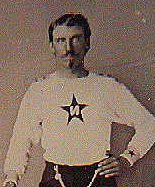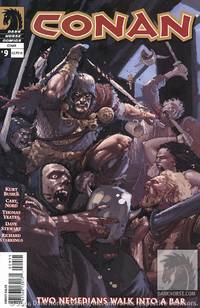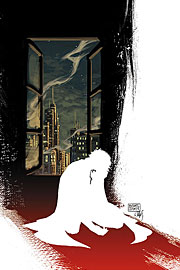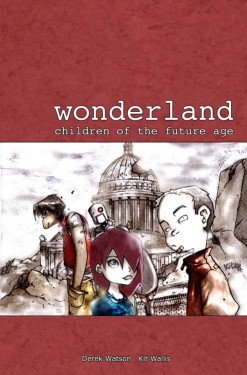|
|
|
|
Jason
Schachat blames society.
|
Jason Schachat's Weekly Breakdown
October 27, 2004
Each
week, Jason Schachat takes you along for his ride on the
four-colored pulp pony. Feed the addiction, and the addiction
feeds you.
Alright, already.
I was late with the Breakdown. Really, really, really late.
Like I NEED to go off my nut every damn week. Make a federal
case out of it whydoncha…
It’s
funny, but no sooner do I say it looks like Adventures
of Superman may finally be going somewhere
then they go spinning off in another direction. Issue
#633 begins with a pretty creepy scene of two innocent
teenagers metamorphosing into wannabe Parasites, but then
we find Clark bumbling through his useless civilian identity.
Lois is all better, their parents hang around the apartment,
incessantly baking, and Clark… well, he’s pretty
much useless. Supes joins the hottie lieutenant interrogating
Xlim in hopes of learning the location of Ruin, but nothing
much happens there, either.
Then it suddenly
occurs to Supes that he should be looking for soundproof
rooms lined with lead, since those would be the perfect
places to hide. He’s been hunting Ruin for two months,
and only now does that occur to him. Just how friggin’
stupid is he supposed to be? I mean, Supes has been badly
written before, but this is Greg Rucka, man. I can’t
remember him letting us down like this before.
And
how many damn times is Lois Lane going to be on death’s
door this year? We’ve got her dead in Superman,
shot and miraculously healed in Adventures of Superman,
marked for death in Identity Crisis, and nowhere
to be seen in Action Comics. And, frankly, the
“nowhere to be seen” approach is working best.
Is Lois in jeopardy all the time? Yes. Do we care? Sorta.
Do we care now that she’s been dead for a year in
one book’s continuity? I sure don’t. Magic superweapon
took her out? Great, so why should I worry that Parasites
are after her? Don’t waste any time on this one.
Oy.
I wasted the last week in the company of fellow Planeteer
Chris Garcia for reasons that now escape me (free booze,
most likely), but I do recall one of the myriad debates
we had concerning modern comic coloring. He maintains the
belief that the comic coloring of the 80s and 90s is far
superior to the “flat” and “sterile”
work being done today. I considered beating him within an
inch of his life, but instead offered the work on Conan
as some of the most impressive ever done on a monthly series.
‘Cause,
regardless of what side you take in the debate, you’d
have to be blind to deny the mastery of the coloring on
this book. We talk a lot about what an amazing job Kurt
Busiek’s done channeling Robert E. Howard and how
perfect Cary Nord’s rough pencils are, but this book
would be nowhere without Dave Stewart’s colors to
simulate the vivid textures of the paintbrush. A moment
of silence for the colorists…
Okay.
|
|
|
There's
an art to mindless mayhem...
|
Conan
#9 finds Conan in the pale streets and candlelit
taverns of Nemedia, making his living as a thief well after
the events of the last arc. Uncivilized as he is, the Cimmerian
brawls and blunders his way through the town, picking fights
with other thieves and the local magistrate, eventually
taking it upon himself to teach them all lessons in modesty.
However, he also attracts the eye of an ancient sorceress
whose intentions seem less than altruistic.
The tone of the
story has changed with Conan’s entrance into civilized
lands that seem rather ignorant of magic and bloody combat,
but the series hasn’t lost any of the elements that
make it so damn appealing. The creative team have proven
that they can breathe life into a property many thought
long dead. Let’s just hope they can keep it going
for years to come. Recommended.
As per
the request made on the forums, I entered into the freshly
minted Aftermath Universe this week with Defex
#1. Sorry to say, I was somewhat underwhelmed.
Stefano Caselli’s artwork jumped right off the page,
but Marv Wolfman’s story of a group of young people
used as guinea pigs in some kinda wacky experiment was so
old its whiskers had whiskers.
The characters
fit the general teen team setup: crybaby, rebel, nerd, mysterioso,
and fillerbunny. The catalyst gives us the impression the
government has its filthy mitts in this somewhere, but all
we know so far is that the kids have powers. Standard superhero
powers granted through the magic of nanotechnology. And
shiny new outfits. Yay.
Marv
Wolfman has never been my favorite writer, so this may not
have been the best Aftermath book to start on, but, for
a line that claims to be starting a new superhero universe
different from those that have come before, it sure feels
like the same old thing. A pretty dull read, but Caselli’s
rich pencils almost make it worth the price of admission.
Not quite. Skip this title unless you’re desperate
to see Gen13 or New Mutants revisited.
I can’t
tell you how relieved I was when Mike Wieringo rejoined
Fantastic Four. The synergy he has with Mark Waid is what
makes this run what it is. Paco Medina’s pencils just
weren’t right. And Karl Kesel may be a fine inker,
but his co-writing during the last arc made for an underwhelming
adventure that didn’t have the charm of the Waid/Wieringo
issues. Fantastic Four #519 (which
still has that stupid “Disassembled” logo on
it) is a perfect example of how humorous, innovative, and
exciting the team can be.
After Zius (who
still reminds me of a certain orangutan doctor from Planet
of the Apes) and his anti-Galactus squad convince Sue Richards
to sacrifice herself for the good of sentient life around
the galaxy, we find her strapped into a big ol’ death
machine. Ben and Johnny try to help, but the aliens outnumber
and overpower them. So, Reed bursts through the wall of
the ship with a ridiculously huge raygun, which he then
fires right at Sue, blasting the machine to pieces and taking
away her powers. All seems well. But it isn’t…
It may annoy
readers to learn that this arc isn’t ending so much
as dovetailing into the next one, but it’s worth the
trouble. This is satisfying storytelling. All the junk the
comic companies dump on us sometimes makes it hard to tell
what’s worth reading and what’s just another
marketing ploy. Fantastic Four doesn’t need crossovers
or spinoffs as long as it has this creative team. It’s
just a great goddamn comic. Definitely recommended.
|
|
|
Hmm...who
could that outline be?
Brother Power, the Geek?
|
Identity
Crisis #5 covers all its bases, giving us
the death of a hero, big developments in the Captain Boomerang
sub-plot, a nice twist on the spouse-killing trend of previous
issues, and a Michael Turner cover that would ruin the ending
if not for the elegiac nature of the story. The last entrée
in this mini left me pretty flat, what with its repeated
threats on superhero wives, dangling threads, and unfair
treatment of Superman. This one makes up for it.
Following further
supervillain roundups, the reunion of Ray Palmer and Jean,
and the startling revelation that Captain Boomerang’s
son can run at super speeds, the issue devotes most of the
story to Tim Drake (the third and now, technically, fifth
Robin) and his dad. Meltzer achieves the same wicked pacing
that made the first issues such pulse-pounding reads, tormenting
us with the smart storytelling that makes this book compare
so favorably to Watchmen.
Rags
Morales skimps on background art a touch more than he should,
but his characters don’t disappoint, and you have
to applaud the way he puts detail in their masked expressions
where any other artist would opt for solid white Batman-eyes.
Identity Crisis will still need a slam-bang ending
to pull off this audacious yarn, but it looks like things
are moving ahead strongly after a mid-season slump. Recommended.
Identity
Disc also hits issue #5, this week, but wraps
up its story with an ending unexpected only because the
device has become so tired out. While the mini always bore
a very vague resemblance to The Usual Suspects,
choosing to rip off the infamous climax of that thriller
just feels lazy. We may have always suspected this low-key
supervillain team-up story was put out just to capitalize
on Identity Crisis, but now we can be sure there wasn’t
any greater goal for the series.
Worse
yet, it has me confused over how many illegitimate children
The Vulture has running around. His whole motivation in
Marvel Knights Spider-Man was raising money for
his grandson’s leukemia treatment, but that’s
his son’s son. And now he has a daughter, as well?
I mean, this is the friggin’ VULTURE; wrinkled curmudgeon
of the Marvel Universe. Who the hell has sex with The Vulture,
much less bears his child?!
And Nick Fury
calling Sabretooth a criminal mastermind? Sure, Fury has
made his bad calls in the past, but what kind of spymaster
would accuse Sabretooth of thinking? The whole wrap-up just
stinks of convenience and bad cross-continuity. I guess
this is what happens when a book featuring Deadpool suddenly
decides to take itself seriously. Robert Rodi should’ve
done us all a favor and stuck with the humorous tone of
the third issue. Attempting this “clever”, spooooky
ending with such a motley crew of supervillain dunces isn’t
worth the time, effort, or your hard earned pesos. Only
buy this if you were suckered into the mini-series early
on and need the complete set to feel at ease.
Madrox
#2’s constant references to film noir
probably wouldn’t sit well in anyone else but Peter
David’s hands. Maybe he’s earned the right to
have characters announce “this is noir” after
what he’s done on Fallen Angel. Not sure.
In any case, the result is fresh, entertaining, and the
best use of X-Factor alumni… well, probably ever (not
counting the original team, natch). Which is, admittedly,
sort of a backhanded compliment…
This issue finds
Jamie Madrox, the Multiple Man, scouring the streets of
Chicago to learn who’s responsible for the death of
one of his duplicates. He saves a guy who looks like Steve
Buscemi from some thugs, and together they try to piece
together what the dupe was up to in Chicago. Back in New
York, a creepy tattooed assassin appears on the scene, apparently,
to hunt down Madrox and all his duplicates, while, at the
XXX Investigations office, Madrox and company are hired
to track down a husband who’s cheating on his wife
through astral projection.
Peter
David’s early introduction of so many threads and
plot twists makes Madrox a dizzying read that’s
already more involving than the majority of X-books. The
disorientation makes sense, when you consider we’re
reading about a guy with thousands of different personalities
knocking around the recesses of his mind, but it gives the
story a meandering quality that doesn’t bode too well
for a five part mini. If this were a long-running book,
the approach would be great. As a limited, it means the
plot won’t get the opportunity to spread out.
Unfortunately,
I’m not enough of a dreamer to think a Multiple Man
series would put dollar signs in Marvel execs’ eyes,
but, hey, at least it’s better than X-Force.
Or Sabretooth. Or Gambit. Or Rogue.
Or Excalibur. Or Alpha Flight. And, honestly,
who wanted a new Alpha Flight book? Especially
one like that? Damn canucks. They’re like brits without
the pomposity and smugness.
And,
speaking of Warren Ellis, I don’t know what the hell
he’s doing in Ocean #1.
The story starts us out smartly with the discovery of some
kind of alien graveyard on the Jovian (that’s Jupiter
to you and me) moon of Europa. Then we get some semi-hard
Sci-Fi that feels like an amalgam of 2001 and Total
Recall as we join a U.N weapons inspector who’s
been assigned to investigate the strange happenings on Europa.
Though, by the end, we still have no inkling of what those
happenings might be. Ellis’ sprinkling of fun facts
keeps the lack of plot-oriented information from getting
TOO annoying, but his characterization of Inspector Kane
as a childish tough guy gets old really fast.
Fortunately,
the art team delivers. Chris Sprouse’s pencils are
clean and uncluttered, Karl Story’s inks are sharp
and solid, and Randy Mayor’s colors are rich and weighty.
One of Ellis’ greatest talents is knowing how to step
back and let the artists take the reigns, and they certainly
don’t disappoint. If only I could say the same for
the story. I’ll wait a few issues to make the call,
but there isn’t enough happening in Ocean to make
me recommend it. I suppose you could buy it on the merit
of Ellis’ reputation alone. ‘Cause that’s
what I’m doing.
Toe
Tags #1 surprised me. And not in a good way.
I’m an avid fan of The Walking Dead, so it
only seemed natural for me to pick up the new book from
the master himself: George Romero. But it just isn’t
the same caliber as Walking Dead. Nothing’s
missing, but I think that’s the problem; this issue
is packed full of too many zombies, explosions, and overlapping
panels. The story begins with rotted corpses being blown
apart and doesn’t take a break from the carnage to
let us be scared or remorseful.
Tommy Castillo’s
art is nice and dirty, but it still harkens closer to the
action genre than horror. It looks great when the blood’s
spraying, but the quiet moments don’t build up tension
or keep the characters entirely proportionate. I’d
drone on about how ridiculous it is for the female heroine
to have a sexy thong slung high on her hips after battling
zombies for three months, but it seems pretty obvious this
is complete fantasy. And that’s the problem; it’s
unbelievable in a few too many respects.
We get a revelation
about one of the protagonists that’s… well,
kinda strange. It pushes the story from something that feels
real enough to be scary into fanciful horror. I guess Romero
writes differently for comics than he does (or did) for
film. If you go into this expecting social commentary, human
drama, or the creepy chill of torturously waiting for zombies
to strike, you’ll be sorely disappointed. If you expect
streets littered with shambling corpses that are then blown
apart by heavy ordnance mounted on an elephant that then
journeys on to the next neighborhood for more of the same,
this is the book for you.
Ultra
#3 continues our heroine’s slow, slow
trip down lovers’ lane with Pearl’s date with
Jason. And, yeah, I’ll admit I wouldn’t mind
swapping places with THAT Jason, but the pacing on the book
is glacial enough to give me second thoughts. This issue
breaks down into roughly four scenes: the cute intro that
has nothing to do with the main plot, a conversation about
superhero romance, the aborted coffee date, and the post-date
wrap-up.
Pearl
might be what you’d call endearingly generic. An everygirl
living a typical romance-impaired working life. Her dialogue
is a lot less forced than her buddy Aphrodite’s, and
I think that’s contributed a lot to the more natural
conversations of the last two issues. Still, this story
may be too subtle for it’s own good. I’m a major
proponent of superhero stories with real-world spins, romantic
focuses, and human concerns, but this one is just dry. It
has nothing on the smart storytelling of Love Fights
and hasn’t worked superheroics into the narrative
like Powers or Invincible would.
And that’s
what it comes down to. This still isn’t really a story
about superheroines. This is a story about celebrities.
The troubles they have fitting into regular society and
relating to the little people. I’m fine with that,
but it’s the kind of thing you can find on your TV
at any time of day. The superhero allegory is cute, but
there isn’t enough wit or clever plotting to set it
apart from the rest of the pack.
The
Luna brothers have succeeded in making a superhero book
that stands apart from the rest. No argument, there. It’s
just not so special when we’re inundated with celebrity
stories in every other medium. You’ll get some chuckles,
and it’s probably even worth the cover price. Then
again, I could say the same of a Friends rerun.
And that’s free. You be the judge.
And
don’t ask me how it happened, but I ended up reviewing
another book where people ride around on an elephant in
a post-apocalyptic zombie world this week. Thankfully, Wonderland:
Children of the Future Age puts these oddball
ingredients in a quirky little oneshot that’d be steampunk
if only they were clearly using steam.
The tale centers
on a group of kids whose father wanders off into the midst
of this post-apocalyptic London, leaving them with only
their elephant, twin-tailed mutant cat, robot, and abandoned
department store fortress to face off against the army of
mutants that lurks about the city at night.
The kids do the
best they can just to get by, but they notice changes in
the mutants’ (who they call Slinks) behavior. Attacks
are no longer limited to the night hours. Large groups coordinate
to ambush the children when they’re out gathering
supplies. Then, one night, the Slinks surround the department
store, calling out for the children. And one of the Slinks
is carrying their father’s compass.
Wonderland
moves leisurely through its plot, and the big surprises
of the climax aren’t really unexpected. At 61 pages,
it feels like more should’ve been happening throughout
the narrative. However, it works as a oneshot, giving us
a quick story and tying it up cleanly. Kit Wallis’
artwork is what you might expect if Ben Templesmith (30
Days of Night) were animating FLCL; dark and gritty,
yet warm and cartoony at the same time. Derek Watson’s
narrative is paced well enough and his characters are simple
and uncomplicated, but the plot is too plain for it’s
own good.
This
is a book that will do well with the kids raised on Jhonen
Vasquez books looking for more serious fare or fans of the
recent IDW and DDP lines. Steampunkers looking for the next
Popbot and Hot Topic refugees desiring a new Gloomcookie
will barely recognize similar elements in Wonderland, but
anime fans should feel right at home. Very mildly recommended.
Hot
Predictions for This Week: The Authority: Revolution
#1, Daredevil #66, Planetary #21, Sleeper Season Two #5,
and WE3 #2.
|










